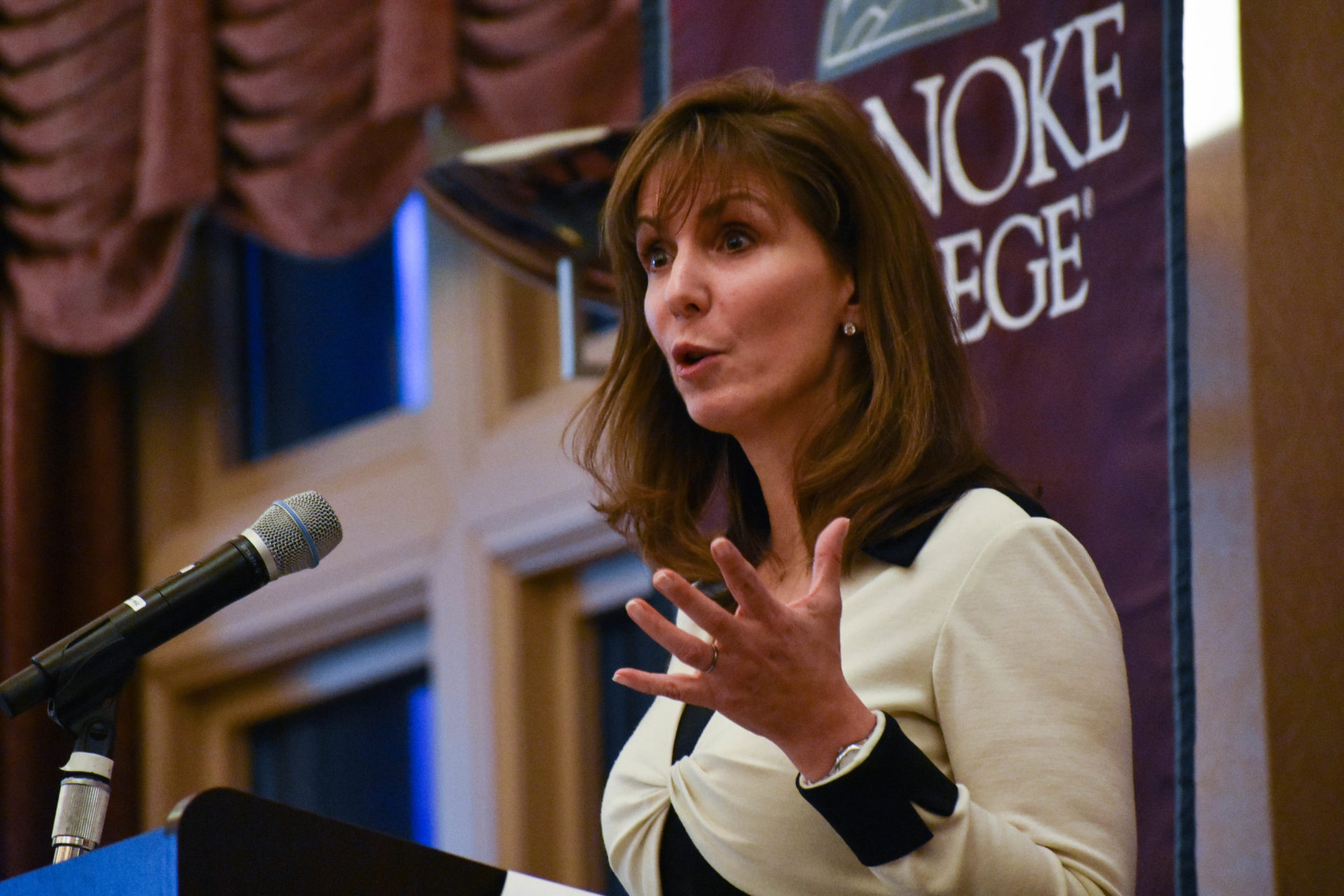Written by Bradley Bommarito
On March 14, Linda Eddleman spoke about her work as CEO of the Trust for the Americas in the Colket Center’s Ballroom. Eddleman shared several ongoing projects in the Latin Americas and fielded questions from the audience. Roanoke College’s Public Affairs Society hosted the event.
Affiliated with the Organization of American States, the Trust for the Americas strives to promote public and private partnerships to advance social and economic inclusion in Latin America and the Caribbean. Under Eddleman’s leadership, the Trust expanded operations to 24 countries and created alliances with over 500 organizations in these regions.
“We spent a large portion of last year looking into new directions for the organization; we are studying challenges in the region so that our current programs will still be relevant in five to 10 years,” said Eddleman.
Perhaps the Trust’s most notable current project is Democratizing Innovation in the Americas (DIA). DIA is a regional initiative launched to foster innovation and empower new generations through access to state-of-the-art technology training, collaboration spaces, specialized curricula, mentorship, and financial resources for social and economic ventures. The goal of the project is to activate the hidden potential and talents of individuals living in vulnerable situations.
“As commodity prices decrease, economies face new challenges. Innovation is key to increasing productivity and opportunity in the Latin Americas. We are working to strengthen the link between education and employment by teaching skills for tomorrow, encouraging sustainable innovation, and promoting data intelligence,” said Eddleman.
DIA operates through innovation labs, collaboration spaces equipped with advanced technology, such as 3D printers, microprocessors, and laser cutters. The DIA program currently has a presence in Belize, Colombia, Costa Rica, Jamaica, and Mexico. It has empowered over 3,000 people through training, launched 158 disruptive innovation projects, and funded 72 seed projects.
“Creating a better match between skills and market needs is important. We have been putting forth strong efforts to introduce updated science and math programs,” said Eddleman.
The DIA initiative focuses on addressing six of the United Nations Sustainable Development Goals (SDGs). Some of these goals include eliminating poverty, fostering quality education, promoting gender equality and creating strategic partnerships with both governmental entities and nongovernmental organizations.
“We all can make a difference. The problems are so big that a variety of sectors must come together to solve these challenges,” said Eddleman. “I see myself more as someone who works in development than diplomacy.”
Larger in scale and more established than the DIA program, the Partnerships for Economic Opportunities through Technologies in the Americas (POETA) initiative is the Trust for the Americas’ flagship outreach program. POETA is a regional initiative that promotes digital literacy, life skills, and job readiness to advance economic opportunities for vulnerable groups, particularly at-risk youth, women, and people with disabilities.
POETA aims to bridge the inequality gap in the region through a multidisciplinary approach that helps participants develop life plans, start or strengthen social and economic ventures, or secure a job, internship or further education opportunities. Impacting over 150,000 people directly, POETA operates through a network of technology centers, which are spaces equipped with computers, adapted technologies and learning materials.
Both the DIA and POETA programs aim to especially benefit women and differently abled people. The initiatives feature special educational and life skills programs to further this goal.
“Walmart asked us to help design a program to train 30,000 women in retail in one year. We are trying to target our programs to include 80 percent women,” said Eddleman.
Though the Trust for Americas is steadily expanding its impact and programs are widely successful, the organization faces challenges in several areas.
“Money is our biggest challenge. Although we are a nonprofit organization that aims to improve lives, it is difficult to raise money to fund our programs and pay our staff,” said Eddleman. “Language and cultural barriers can also be challenging.”
Eddleman encourages students with an interest in nonprofit work, international relations, and related areas to work on their language skills.
“Languages are very important skill sets to possess. Since I left law school, I’ve found that speaking Spanish is just as important as my law degree,” said Eddleman.
Though socioeconomic disparities and regional challenges may seem overwhelming, Eddleman reminds young people that they can have an impact from many different career fields.
“You can have an impact from a private company, social impact firm, or government agency. Real change can only occur when people from a variety of areas come together. There are many pieces to the puzzle,” said Eddleman.
Special thanks to Gaston Ocampo and Diego Meneses for their work with this event.




